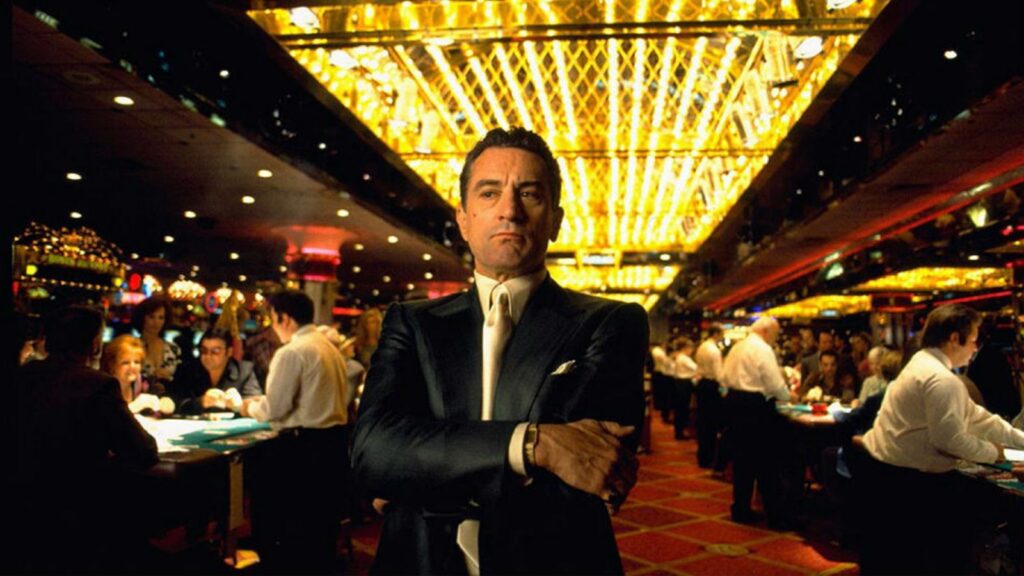Back in 1995, when Casino first hit theaters, there was soon much debate as to where the movie ranked in the pantheon of Martin Scorsese’s growing body of work. There were attempts to look at it through the lens of the final leg of a trilogy, following up on Mean Streets (1973) and Goodfellas (1990), although that feels somewhat forced today. The film wasn’t universally praised on release, though it has earned more respect over the last three decades.
However, we won’t debate the merits and faults of Casino today, as that conversation has been done to death. Instead, we’d like to zero in on one of the themes explored in the movie – the death of the ‘old Las Vegas.’ That, in a sense, is the film’s final takeaway. The mafia’s involvement in the casino business – and the life of the city – fades away in the 1980s to be replaced by corporatism. Robert De Niro’s Sam “Ace” Rothstein narrates this at the end of the movie, hinting at something lost that goes beyond the demise of mafia control. “The town will never be the same,” says Rothstein. “Today, it looks like Disneyland.”
Movie Charted The Sanitization Of Las Vegas
Of course, a movie with a 178-minute runtime is not long enough to go into every intricate detail of how the mafia lost its grip on Sin City. The seeds of corporate ownership were first sewn in the 1960s, and law enforcement had already put the squeeze on organized crime long before Operation Strawman, which is the basis for the film’s finale. The bottom line, though, is that Scorsese was fairly accurate at portraying how and when the hammer fell, even if the mafia did linger on the periphery of casino life into the 1990s.

Nonetheless, the movie is quite prescient. In a sense, it grasped that there would be a kind of sanitization of Las Vegas years before it happened. Even in 1995 – years after the movie was set – the corporate takeover had not yet fully materialized. Our perceptions of Vegas remained in the classic sense: the unscrupulous casino owners, the tough pit bosses, the sense of danger in the air, and a city with an edge of illicitness.
The movie ended with a sense of bleakness of corporate takeover that the soul of the Vegas we knew would be replaced with something else. Today, you can sense that the aspect of something being lost is true. Sure, there are parallels with the old-school Vegas, including the shows, the hedonism, and the worship of the greenback, but the vibe is completely different. It’s a fast-growing city, more likely to draw in tech workers than mobsters looking for a fresh start.
And then there’s the casinos themselves. Vegas has had many challenges to its casino economy. There’s the digital alternative, with anyone able to play games as varied as high-stakes live roulette to top slots at casinos online. The point, as such, is Vegas is no longer a place where people need to go in order to gamble. The casinos remain part of the allure, at least for some people, but you jump on any plane heading into Harry Reid International Airport, and the people on it will tell you they are going for the pool parties, superstar DJs at nightclubs, the Michelin star restaurants, the Raiders’ game, and so on.

Las Vegas Is More Than Its Casinos
Scorsese and scriptwriter Nicholas Pileggi wouldn’t have been fully aware of the changes that would come to Las Vegas. Yes, they believed that corporate interests would blow away the legacy of mob rule, yet there was a conveyance that corporatization would rule in its stead, and that’s only partly true. Yes, the Wynns and Hiltons arrived to take over the casino resorts, but Vegas did not sell its soul to corporations, at least not fully. The movie-makers saw, as Rothstein said, Disneyland for adults, but that detracts from what Vegas has become.
Again, that’s the irony that the movie tries to convey – you replace mob rule with corporate rule, and they are both just as corrupt, at least in the eyes of Rothstein. But with, let’s say, New Las Vegas, there is no longer control. Yes, the large casino resorts dominate the Strip, but the city is now much bigger – in both a literal and figurative sense than the casinos, casino economies, and casino culture. Pileggi wrote the original novel when Vegas meant casinos. Now it means so much more.



